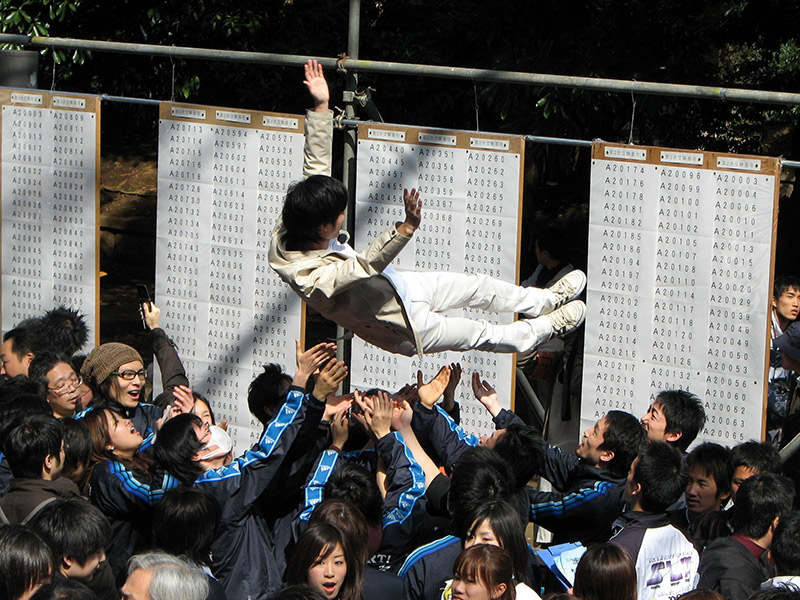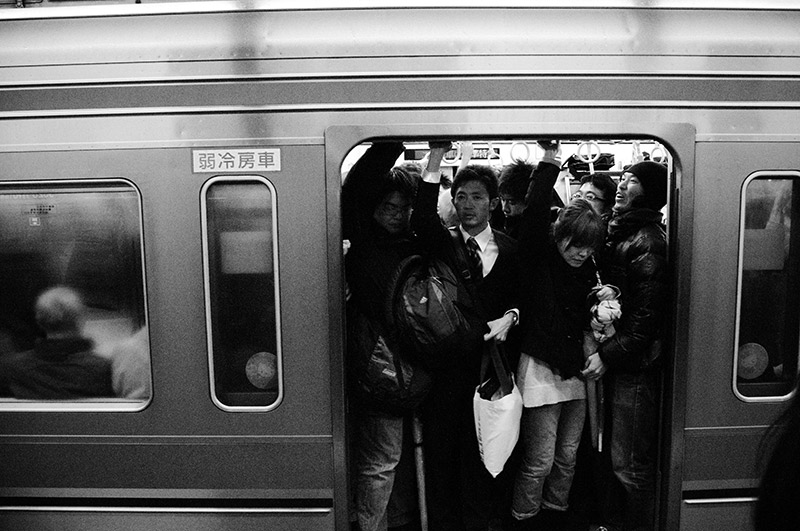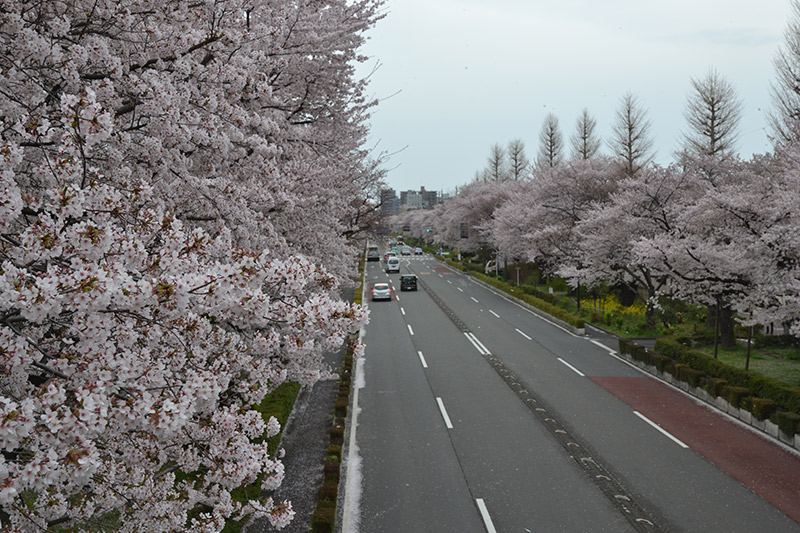- 大学は 人生の 春休み。
- College is the spring break of life.
- 遊ぶのは 大学のうち。
- You can only play while you're still in university.
These are all various sayings which I have heard the Japanese use to describe their college lives. In my last article I mentioned how academics are really not Japanese universities' strong points and this article aims to flesh this point out.
If you buy into the stereotype of Japanese people being hardworking you would be very very wrong when it comes to college students. As said before, if you're looking for deep probing academic vigor and intellectual stimulation Japanese universities really aren't for you.
What certainly is true is that barring certain exceptions such as med school, the majority of Japanese students don't (and often don't need to) take their college life seriously. But four years is a long time to just be slacking off and enjoying freedom – the question therefore is why go to college at all?
And what do I mean by "Spring Break"?

Perhaps to illustrate the point better, let's use the example of an imaginary Japanese youth – let's say his name is Takashi. Assume that he's a current student in a mid-to-high tier university.
He doesn't really study during college. But then he's really not the only one. The statistics are clear – Japanese students do not study. An earlier Japan Times article quoted some University of Tokyo research which stated that Japanese students study far less than American college students. Takashi skips a few classes a week, and for the lessons that he goes to, even if his classmates are physically present a large number are having a mental vacation in dreamland while the lecturer drones on.
What do Takashi and his schoolmates do then? Some of his classmates spend their time on partying and doing gõkon and playing computer games etc. He occasionally joins his classmates for all-night mahjong games at his friend's house. Some of his friends spend their time on part-time jobs. Heck, being from a relatively high-end university many of his friends who do not go to school spend all their time earning an income teaching high school students on how to work hard for their exams. Then there are those, especially sportsmen, who pour all their time into sports clubs or other student activities.
Basically, anything but their books.
Before and after

Takashi was miserable in high school, as many Japanese students are – though this is very true for East Asia as a whole. Starting from the second year of high school Takashi started gearing up for the all important university entrance examinations. So, depending on his subject combination, he may have to slog through calculus and memorize a history curriculum that almost seems to aim to make students into mini-Wikipedias. Looking at his notes on classical Japanese, he tries to figure out the language of his great ancestors about 20 generations ago but all that comes to his head is a big maji de?! (like really?!).
Say he screws up an examination. If his family can afford it then he's most likely off to extra classes at a cram school (juku). Actually, he'd likely end up going to those extra classes anyway even if he didn't do so bad. If you fail to make it into your target university you become a ronin, which basically means you have to wait another year, study hard, and then take the entrance examinations again. It's not something that most high schoolers want to experience once, let alone twice.
So after a possibly delayed year and after puzzling through both classical Japanese as well as English grammar, he finally enrolls in college. He moves from one of the more rural parts of Japan to Tokyo, the big city, for university. The first day he takes the train to school at around 8:30AM and gets squashed by the morning crowd of half-asleep suits and stifling neckties. In the morning Tokyo train, almost nobody smiles.

He goes to school and finishes all his classes the first day – dutifully attending all of them. He finishes near 6PM and is just on time to be hit by the evening rush of people who actually don't have overtime. Some other day within the first week he goes to an introduction session by one of the student clubs – maybe a sports club, maybe a band circle – and tries to board the train around nine. Even at this time the trains are still full, now from those who worked overtime. Another time he stays back for a welcome (shinkan) party and boards the train at 11PM. The crowds have thinned a bit but the number of people still in suits is obvious. Some of them are reeking of alcohol from a company nomikai (drinking party) and are entirely red in the face.
On the train rides home looking at the drunk salarymen on the train he realizes that he's looking at a reflection of what he will be four years down the road. But then that's what he came to college for anyway. Get a degree, a nice university's name to your resume and start work, and work and work and work and work (and work).
The day after the shinkan party he had a class at 9AM. But he misses it because he can't wake up. After all, since he's going to work and work and work anyway, what's the point of working so hard right now? It can wait.
Not getting up becomes a habit because work can wait and sleep can't. Especially because his parents are not around to parent him, his attendance, especially for morning classes, slumps.
There's other stuff too

The above is the "conventional" explanation for why students like Takashi don't take their college life seriously, but if you think about it, if not studying actually had an impact on Takashi's future career, he surely wouldn't take things so easily.
Luckily, it does not. Japanese companies – based on anecdotal evidence – do not really look at an applicants' grades when they apply for jobs. What they do instead is look at the university name and after document screening subject job applicants to a barrage of interviews, internal tests, discussions and the like right in the middle of the school term – which in itself indicates how much companies value the education that the universities provide for their students.
Takashi may have joined a sports club which requires him to wake up for morning practices in addition to afternoon practices which coincide with lessons. It is obvious which he will prioritize. If the club is vigorous enough it is likely that he will have to repeat a year in university.
But this to him is indirectly investment in the future – in exchange for holding up the reputation and achievements of the club, the alumni of the sports club are very likely to pull some strings such that the club members will get a foot up during their job searches. One friend of mine in a judo club even says that members have their names on the name-list highlighted in yellow during job interviews for companies where alumni are already working.
And more other stuff

But in the first place, why should Takashi come to class?
After all, for some classes he is packed into a lecture hall with 400 other people for a lecture – in such a case obviously no attendance is taken. Even if attendance is taken in other classes he can just ask his friends to sign on his behalf. In any case he can just study for the exams – someone in the class is attending the lecture and he can just ask that person for his notes later.
And about the exams, well they're not that hard. After all, 80% of sociology papers involves multiple choice and filling in the blanks (note: true story, it happened to me). And since there are so many lectures with big class sizes – and because the lecturers do not want to commit suicide – the only form of grading occurs from that one end-of-term examination. After all, which lecturer would want to read 400 students' assignments?
And even the workload for small classes isn't that high. Many exchange students comment on how outside the Japanese courses (which can be intense), the amount of readings they have to do per class is really low compared to their home universities. In my university it is also not uncommon for students to take around 16 different courses in their first semester. That's right, sixteen different courses. This does not mean that they pull all-nighters every day to do their work (they're more likely to pull all-nighters drinking or at mahjong). It means that the courses themselves aren't very intensive.
So in conclusion…

In Japan college isn't that intensive at all. But this does depend on the subject (medicine is an exception), the university (there is a gradient) and of course the individual student. Takashi is just an example for one of the many Japanese students who really take their college "educations" as spring breaks – there are certainly many who do not.
However, that being said, not paying that much attention to school is not in itself a bad thing. After all, instead of trying to pay attention to a sleep-inducing lecture, some people do take their time out to do volunteering, activism or exploring the world outside the confines of their university.
But this is not the majority – so do not come to Japan expecting that you'll be adding that much to your formal academic education. To be frank, Takashi is not, so neither should you.
Things are supposedly changing though. Employment prospects in Japan have supposedly been worsening over the past few years and companies are taking a closer look nowadays at what people do during their university days before hiring them. But the situation has remained largely unchanged in the everyday lives of Japanese college students.
This article may seem to conflict with the earlier article I posted about why you should come to Japan and to some extent it may. However, the point of coming to Japan is not the education per se but other reasons.
I'm therefore thinking about writing an article about not "why" you should come to Japan (like the previous one), nor about "what" actually happens here, but "how" to approach university in Japan, as well as what I think are the main types of approaches which people employ when they are here.
